Alexander Payne’s most recent film, The Holdovers, a critical darling and Oscar nominee, finds him directing an original screenplay for the third straight film in a row. Written by David Wemingson, Payne’s latest proves that no matter what he helms, an adaptation of a novel or an original work scripted for the screen, his sensibilities will always be on display. His works are always humanistic tales of grief and solitude and about ordinary individuals who long for a deeper purpose aside from their mundane existence. Not since Hal Ashby, whom Payne cites as a major influence, has an American filmmaker tapped into the human condition with such complexity, curiosity, and poignancy.
Aside from Downsizing (2017) Payne’s filmography has been a substantial landmark for American cinema abroad. Generating great critical acclaim and commercial success, he won two Best Adapted Screenplay Oscars for co-writing Sideways (2004) with Jim Taylor and for writing The Descendants (2011). He has also received three Best Director nominations for Sideways, The Descendants, and Nebraska.
Now entering his fourth decade of making movies with his eighth film, The Holdovers, which is somewhat of a comeback movie after being on a six-year hiatus, the film is a wonderful reunion with Sideways lead actor Paul Giamatti, who holds very strong chances of possibly walking away as Best Actor on Oscar night. Payne has brought us laughter and tears with his deeply moving character studies. Check out my list of his very impressive filmography, his highlights, his letdowns, the plain state movies, and the most renowned of his career, ranked from worst to best.
8. Downsizing (2017)

Bigger doesn’t always translate to better, and that is exactly the case in Payne’s most ambitious and expensive film to date, Downsizing. A film that failed both critically and commercially, which is considered his worst by a long stretch, A science-fiction comedy-drama set in the not-so-distant future, Payne casts Matt Damon as a good-tempered therapist named Paul Safranek, and his wife, Audrey (Kristin Wiig), volunteers themselves to a human project led by a group of scientists where they figure out a way to shrink themselves into five-inch-tall versions of themselves in a smaller community, gain greater wealth, and in return, stop the spread of overpopulation, global warming, and overconsumption of natural resources. Of course, the plan of living in a tiny community doesn’t live up to the promises and creates a whole set of unanticipated problems for Paul along his journey.
The film is large in satirical ideas and rather refreshing in approach, but the ideas eventually exhaust and undermine the material. After all, Payne has always been a genius with sharp character depth, but it doesn’t quite resonate here. Damon has always been a great lead actor, but he didn’t quite bring the heart that other Payne’s protagonists have brought before. Hong Chau delights in her supporting role as Tran, a Vietnamese dissenter who is imprisoned and “downsized” from her own country as a form of punishment. You can sense that Payne and frequent co-writer Jim Taylor were determined to get outside of their comfort zone, but the end results backfired, and Payne’s promising vision became a disappointing one.
7. Citizen Ruth (1996)
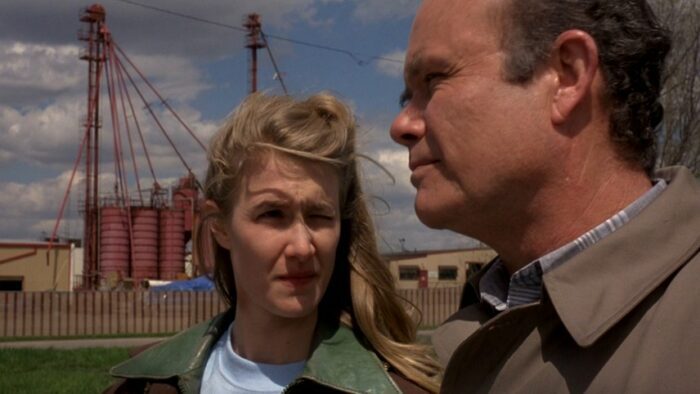
Citizen Ruth marked Alexander Payne’s feature film debut as a writer-director. It was released in 1996 and set in Nebraska, Payne’s home state. The film stars Laura Dern in her first of two appearances so far in a Payne film (she also appears in Downsizing). She plays Ruth Stoops, a troubled woman who has an addiction to getting inebriated from inhaling spray paints and sniffing glues.Upon getting arrested, Ruth discovers that she is pregnant, and she could face felony charges for harming a fetus. Ruth was wondering if she should even carry on with an abortion; she lost custody of her first three children due to her inability to raise them. Ruth ends up getting bailed out of jail by Norm (Kurtwood Smith) and Gail (Mary Kay Place), an evangelical couple who become aware of Ruth’s hardships after reading about her story on the local news. The couple ends up welcoming her to their home in hopes of persuading her to keep the child. Meanwhile, it was revealed that one of Gail’s friends, Diane (Swoosie Kurtz), is actually an imposter and a left-wing feminist who infiltrated her pro-life group and ends up informing Ruth that she is being used as a pawn for their agenda. Ruth finds herself in a culture war that generates a national media frenzy about her situation, which leads to both sides trying to outbid her choice of whether she should keep it or go on with her original choice of an abortion.
It was Payne’s debut film here, where you can see a young auteur at work that set him apart from any other indie filmmakers. For starters, he brought up a very timely issue like women’s reproductive rights and rendered a richly satirical, stately movie that was darkly comedic, sad, and impassioned, but finally moving. Payne proved from the beginning that he knew how to take very flawed and wounded characters and push them to nuance. Despite some detractors labeling his films condescending, the film was anything but as Payne ended up finding compassion for Ruth and choice—especially in part to Dern’s tenacious performance that is paid off in a very modest way during the final scene.
6. Nebraska (2013)
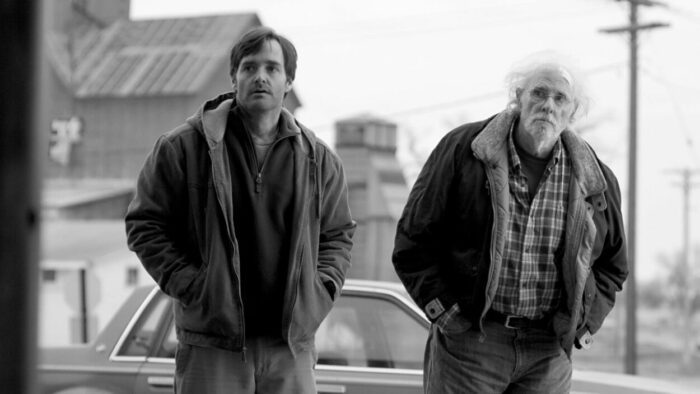
Alexander Payne’s first directed film that he didn’t write was an original screenplay written by TV Sketch writer Bob Nelson, but it still had all of Payne’s markings and sensibilities. Nebraska is a black-and-white comedy-drama road movie about an elderly father and his son who travel across Montana all the way to Nebraska to claim a million-dollar sweepstakes. The film’s cast includes Bruce Dern, Will Forte, June Squibb, Bob Odenkirk, and Stacy Keach. It’s a wonderful cast where each actor brings a naturalism to their roles, and each of the leads is given moments that elevate their characters out of one-dimensional caricatures even when some of the supporting characters, like the dimwitted cousin scenes (Deven Ratray and Tim Driscoll) do not.
The film plays out like a modern-day Don Quixote treasure hunt, as the journey to cash in the prize feels endless and out of reach. Dern plays Woody Grant, a retired auto mechanic who grows more senile by the day, but his mind is determined to get those million-dollar prizes. When he begins walking on the highway towards Nebraska, it’s only a matter of time before his son David (Forte) joins him as an opportunity to spend more time with his father in his later years., eventually leading Woody’s wife and David’s mother Kate (Squibb) and their elder son and David’s brother Ross to meet them along their journey.
Nebraska is a very moving film that did very well with critics and viewers, and it received six Oscar nominations. Payne was given the script just after completing About Schmidt, and he decided on the spot that he wanted to direct it after completing Sideways and The Descendants. It might have taken 10 years to get Nebraska off the ground due to casting difficulties, but Payne stuck with his guns and went with Dern. Nebraska is humorous and engaging, but it’s far from his best work.
5. Election (1999)
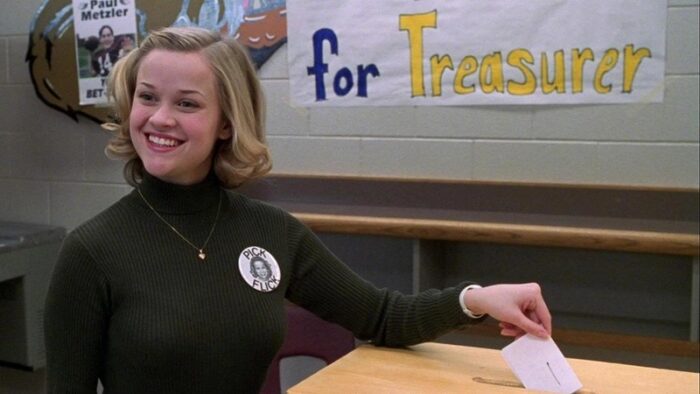
Election, Alexander Payne’s sophomore film, strays into the teenage comedy genre, casting Matthew Broderick and Reese Witherspoon in some of their most impressive and darkest comedic roles yet. At the film’s center is Jim McAllister (Broderick), a high school government teacher who becomes rivals with his overachiever student Tracy Flick (Witherspoon). As Tracy runs for student body president, Jim holds some resentment towards her after she had a sexual relationship with his colleague and best friend, fellow geometry teacher Dave Novotny (Mark Harelik). While Jim feels Dave deserves to face consequences for his actions, he feels Tracy is a self-serving opportunist. Through this, McAllister ends up convincing Paul (Chris Klein), a simpleminded but popular student athlete, to challenge Tracy. Jim also gives pointers so Paul can gain more votes to defeat Tracy, and this escalates the tension between them.
Their situations gain more friction when Jim does other unethical things to sabotage Tracy’s election campaign, even if it means throwing away a few votes from Tracy during the recounts. Election is similar in satire to Citizen Ruth, which was also about fellow Nebraskan residents doing vicious things towards one another for their own personal gain. The tone of this film is even darker in humor than all of other Payne’s films, which likely explains how well it picked up a cult-following and eventually a spine in the Criterion Collection.
Election was the second time Payne was in the director’s chair too, and you can already see the growth in his writing and directing style. For that reason, it’s often thought of as the earlier film before Sideways. It ended up being the first adaptation by Payne and second of six features he co-wrote with fellow screenwriter Jim Taylor. The movie remains one of Payne’s sharpest and most sophisticated films and is found on many critics’ top 10 best of the year lists for 1999.
4. The Descendants (2011)
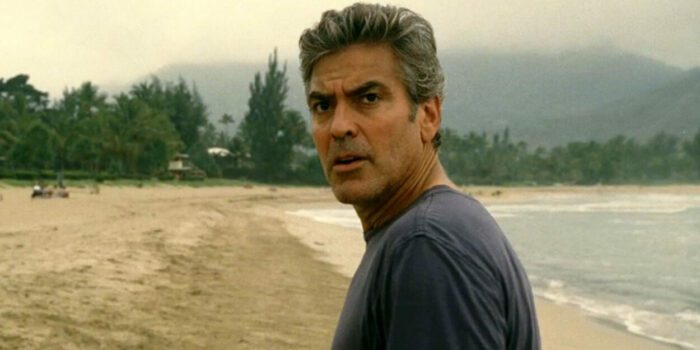
The Descendants begins with a lively medium-shot of a middle-aged woman (Patricia Hastle) water skiing off a boat before it fades away into black. This is the only time we see her conscious in the film, and we learn that her name is Elizabeth King, and she is the husband of Matt King, and they have two daughters named Alexandra (Shailene Woodley) and Scottie (Amara Miller). We learn that Elizabeth is now in a coma after a tragic boating accident that occurred as she was water skiing. The story follows Matt and the daughters having to deal with the grief and upholding Elizabeth’s will of being taken off life support so she can die with grace. Matt is also faced with other challenges when he is pressured by relatives to sell their families land trust to potential holiday resorts. Other revelations occur once Matt discovers from Alexandra that Elizabeth was having an affair with him behind his back, with a local realtor named Brian Speer (Matthew Lillard). At the same time, Matt is faced with so many advertise to juggle. He aims to be a better father to Alexandra and Scottie while enduring the hardship of the mother of his daughters and his wife dying.
The Descendants was Payne’s first film in seven years, an adaptation of Kaul Hart Hemmings 2007 novel of the same name, and he proved, with the aid of fellow co-writers Nat Faxon and Jim Rash, he wasn’t rusty. The film reassured Payne’s gift to craft flawed characters, and he once again weaved its protagonist with familiar themes of grief, family, and self-discovery. The film sets up so many dramatic trappings for Matt that involve—his two daughters—his wife’s coma—the sale of property—having to deal with his selfish and inconsiderate father-in-law (Robert Forster)—and confronting Elizbeth’s lover, who is also married to his wife (Judy Greer).
The Descendants achieved commercial and critical success, earning Payne his second-Best Director Oscar nomination and second nomination for Best Adapted Screenplay. The Descendants was also nominated for Best Picture, and it did well at the box-office, it’s also George Clooney’s most poignant performance where he plays an imperfect man in crisis in a perfect movie.
3. The Holdovers (2023)
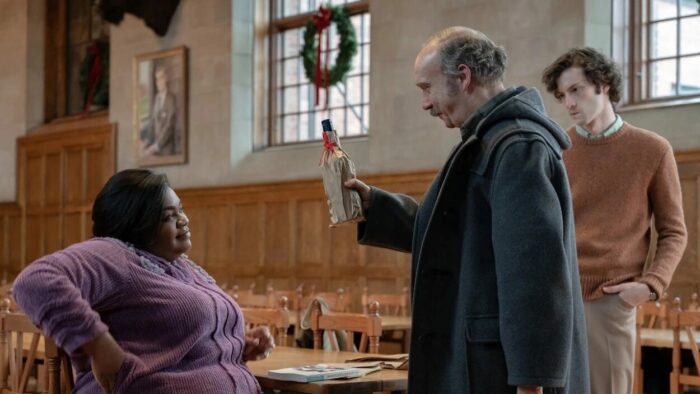
It is impossible to reflect back and ignore Alexander Payne’s love for 1970s style of American filmmaking. Even when all of his previous films were set in modern day, there was something about his work that felt like it was the workings of Hal Ashby (Harold and Maude) and Bob Rafelson (Five Easy Pieces). In The Holdovers, his first period piece of his career, he gets to capture that era’s aesthetic, spirit, and tone right in the opening minutes with its title cards and music. The 1971 setting is almost a character itself, and it’s a love letter to that era of filmmaking, but it’s far from a nostalgic rehash.
Reuniting with Paul Giamatti for the first time since Sideways, Giamatti plays the role of Paul Hunham, a curmudgeonly teacher at a New England board school who is stuck at the school during break with his student Angus (Dominic Sessa). Angus is one of the few other of his classmates who were known as holdovers during the holiday break due to their parents not being able to make arrangements to bring them back home for the holidays. Paul ends up forming a bond with Angus, who is troubled, but Paul sees a lot of potential due to his sophistication and wit. They also end up bonding with the school’s head cook, Mary Lamb (Da’Vine Joy Randolph), who is a widowed woman who tragically just lost her son in the Vietnam War.
At this point in his life, Paul has kept his distance from many, and he is very uptight and strict. With strong writing by David Hemingson. Where the story is by Payne, the film holds a lot of sharp writing and genuine exchanges with each of the characters. The character depth and the performances by Giamatti, Dessa, and Randolph are superb, and this film will certainly age well over time. Particularly how it tapers into human anguish, where every character is given great emotional depth that never feels too manipulative or sentimental. This is a film that has touched many moviegoers in many different ways, and the time period works as a great backdrop for the human condition. It would be remarkable and a much-deserved win if Giamatti won his first Oscar for this role.
2. About Schmidt (2002)
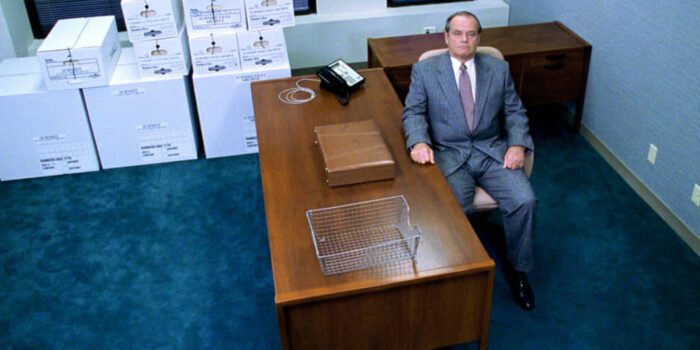
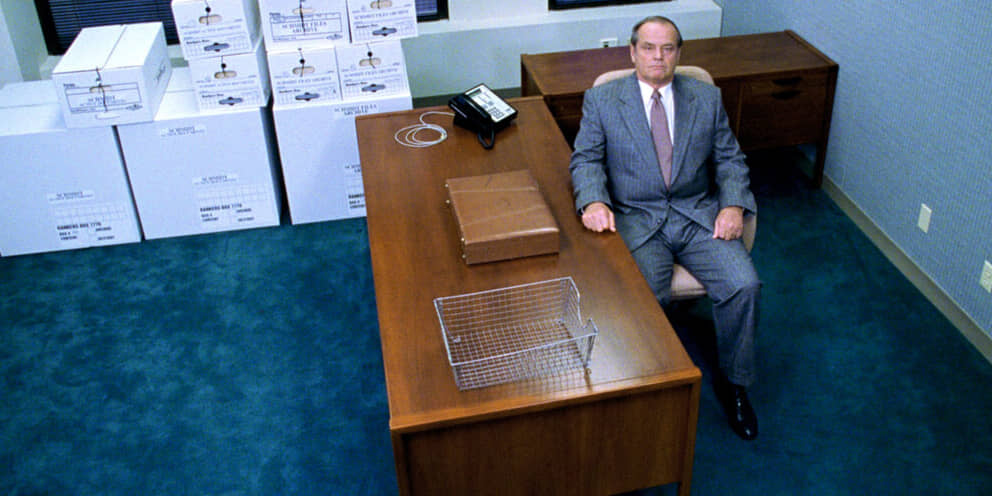
Existential exploration has been a common theme in much of Payne’s filmography. He favors stories of deeply flawed lonely men attempting to find greater meaning in their mundane existences. About Schmidt falls into this category. The film is set once again in Omaha, Nebraska, focusing on Warren Schmidt (Jack Nicholson), a vice president of a life insurance company, patiently waiting for the clock to hit 5 p.m. Payne stages the action from meticulously high angles that heighten his vulnerability. We learn that Warren is now retired. He goes to his retirement party, where it begins to dawn on him that his whole life, job, career, and all other materialistic belongings feel meaningless. He feels empty and disconnected from his wife Helen (June Squibb), and he is estranged from his only daughter Jeannie (Hope Davis), who is about to get married to a waterbed salesman named Randall (Dermot Mulroney).
Warren’s life is faced with a curveball after Helen suddenly dies while he’s out running errands and getting ice cream. The tragedy allows him to reconnect with Jeannie at the funeral. With the wedding on the horizon, Warren tries to persuade Jeannie to hold off the wedding, which Jeannie rebuts isn’t what her mother would want. After Jeannie and Randall return to Colorado after the funeral, Warren finds himself slipping into depression after being a widow. Eventually, Warren lifts himself out of depression to help Jeannie with her wedding arrangements, as he also makes a cross-country road trip throughout the Western Plains. Throughout the film, Nicholson narrates it with a clever narrative device in which he pens about a Tanzanian boy that he sponsors, and Warren writes very open, personal, and rambling letters as they always start off with “Dear Ndungu.” Upon Warren’s arrival in Colorado, we learn that Warren has other intentions in persuading Jeannie not to marry Randall, but Randall’s spirited mother, Roberta (Kathy Bates), knows how to counteract Warren’s anxieties. Warren slowly comes to his senses and begins to realize that, in order to make a difference, you have to consider what other people want aside from your own.
The story is moving, but it is also one of the greatest representations of the realization of aging. The film is unapologetic in exploring these themes, and Payne pulls off a stunning character study. Nicholson’s performance is also remarkable, which earned him his 12th Oscar nomination. He brings an embeddedness throughout, and even with joy and existential melancholy on display, there is an unsentimental warmth to behold in Payne and Nicholson’s collaboration. While celebrated at the time, About Schmidt hasn’t quite reached the shelf live as Sideways and wasn’t as beloved as The Holdovers, but hopefully fans of The Holdovers and new fans of Payne will gravitate to this film. Also, can we please get a Criterion for this by now?
1. Sideways (2004)

Yes, many film buffs who are Alexander Payne completists are in agreement that Sideways deserves to be in the top spot. It’s unanimously praised as his greatest film. It was a huge sleeper hit upon its release, famously getting more people into Pinot Noir wine and known as the movie that was defeated by Clint Eastwood’s Million Dollar Baby for Best Picture.
The film is centered around aspiring writer and grade school literature teacher Miles (Giamatti), a lonely wine enthusiast who suffers from depression and hasn’t gotten over his failed marriage with his ex-wife. To ease his mind, he ends up taking his old dorm roommate from college, Jack (Thomas Hayden Church), on a trip to wine country to celebrate his last week of being a bachelor before getting married. Jack ends up using the trip as a cover-up to celebrate Mile’s book deal, which is actually being shopped around by various publishing houses. Miles has to live up to that lie Jack built once they encounter Mya (Virginia Madsen), a fellow wine enthusiast who waits tables at Miles’s favorite restaurant. Eventually, they find themselves on a double date with My and her friend Stephanie (Sandra Oh), and the film becomes a bittersweet journey about growth, and the wine is utilized as a great metaphor for the themes. Payne and co-writer Jim Taylor adapt Rex Pickett’s novel with hilarity, melancholy, and warmth. They take the viewer through the ups and downs of Mile’s anxieties on the trip, focusing on his vulnerabilities and his insecurities, as Jack tries to bring some encouragement for Mile’s downer demeanor while coming to terms with his own imperfections.
Twenty years later, Sideways remains Payne’s most celebrated; it’s also the film that brought Giamatti even greater notoriety over the years, and this small indie film has made an ever-greater comeback with remembrance as of late due to the release of The Holdovers. Let’s hope this film will continue to age like a fine wine that it is.




Very nice! I’m much higher on Nebraska and Election and lower on The Descendants and Sideways than you are, but this was a very nice spotlight